Race to Resilience in action: Women on the frontlines of marine ecosystem protection in Zanzibar
By Climate Champions | October 28, 2024
Location & Region: Pemba Island, Zanzibar – East Africa.
Partner: Global Fund for Coral Reefs (GFCR)
Implementer: Blue Alliance PECCA
SAA Impact System: Coastal and Oceans Systems
Impact / Beneficiaries: 27,000 hectares of highly biodiverse coral reefs, protecting 40 threatened marine species and directly involving over 800 coastal community members.
On the coast and in waters off Pemba, Zanzibar, two women, Asha Juma Khamis and Asha Bakar Mtwana, are on a mission. As marine rangers of Blue Alliance PECCA, they patrol the North Pemba Channel Conservation Area (PECCA), to preserve the vibrant marine ecosystems that sustains their community.
Asha Juma Khamis, 41, and Asha Bakar Mtwana, 38, are both female rangers living in the Makangale area of North Pemba, Zanzibar. As part of the Blue Alliance PECCA enforcement team, these courageous women are on the front lines, working relentlessly to protect the ocean.
Each day, they embark on boat patrols, removing illegal fishing nets and educating local fishermen on sustainable practices. On land, they walk the beaches and mangroves, teaching fishermen about the importance of catching fish and octopus of the right size to avoid depleting stocks. These patrols ensure that the waters of the North Pemba Channel Conservation Area are protected from illegal activities, benefiting both marine biodiversity and local communities. In addition to the daily patrols, the Blue Alliance rangers are involved in monitoring Crown of Thorns Starfish, protecting sea turtle nests, and raising public awareness.
About the Pemba Channel Conservation Area
The Pemba Channel Conservation Area belongs to the world’s most biodiverse regions. Its unique marine environment is home to more than 40 threatened marine species, including the endangered Napoleon wrasse, green and hawksbill sea turtles, reef manta ray, dugong, and several shark species, such as the grey reef shark and the scalloped hammerhead. The Pemba Channel, which separates the island of Pemba from mainland Africa, is also known for the highest cetacean diversity and relative abundance in the country, hosting 13 recorded species, including the endangered Indian Ocean humpback dolphin and the Indo-Pacific bottlenose dolphin.
50% of Tanzania’s reefs are located around Pemba Island, and the Northern Pemba Channel Conservation Area which Blue Alliance PECCA is managing, encompasses approximately 27,000 hectares of highly biodiverse coral reefs, mangroves, and seagrass beds. The cool water upwellings from the deep Pemba Channel, which separates Pemba Island from mainland Tanzania, make Pemba Island’s coral reefs a potential refuge against climate change.
About the Pemba Programme
Through catalytic grant funding and support from the Global Fund for Coral Reefs (GFCR) and the United Nations Capital Development Fund (UNCDF), Blue Alliance Marine Protected Areas established a blended finance facility that will contribute to effectively protect, manage, and monitor networks of MPAs. The financing facility is positioned to scale up reef-positive businesses, which contribute financially to the MPA management through dividends and/or revenue sharing, allowing to cover operational costs such as ranger salaries, conservation activities, livelihood development, scientific monitoring and research, and empowerment of women on the frontlines of climate change. Now fully operationalised, the facility is attracting capital from private investors including BNP Paribas and UBS Optimus Foundation.
In Pemba, the blended finance programme is led by Blue Alliance PECCA with a strong partnership with the Ministry of Blue Economy and Fisheries (MBEF) of the Revolutionary Government of Zanzibar and the local communities. This partnership enables the co-management of the North Pemba Channel Conservation Area, including the implementation of sustainable fisheries and enhancement of compliance with fishery and environmental laws within the area. This is achieved through a combination of surveillance, long-term community engagement programmes, and the enforcement of fisheries legislation aimed at combating destructive and illegal fishing methods. Regular joint patrols, consisting of local police and military representatives, Shehia — the lowest official administrative unit in Zanzibar — fishing committee enforcers, and Blue Alliance PECCA rangers like Asha Juma and Asha Bakar, are a key component of this effort.
Working closely with the local government and the community members, the initiative seeks to enhance the management of marine ecosystems in Pemba, through targeted efforts on promoting economic growth, social inclusion, and improved livelihoods for Zanzibaris while ensuring environmental sustainability.
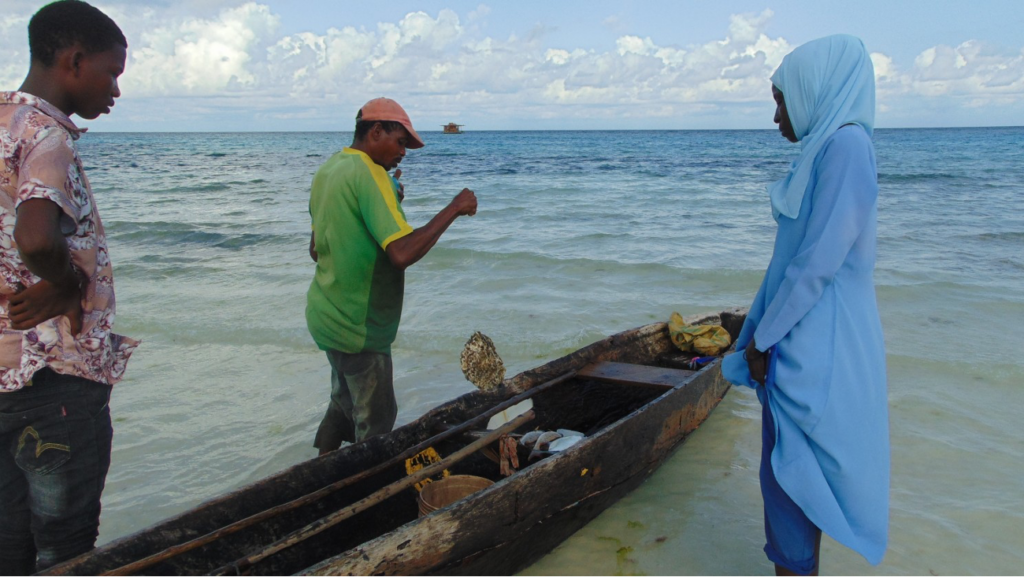
Ranger Asha Juma (r.) explaining to the fisherman the appropriate size of fish he should catch.
The Blue Alliance rangers continuously enhance their conservation efforts and utilise new enforcement strategies and tools, including the EarthRanger app to make their patrols more effective. This tool helps them track illegal fishing and other activities in real-time, even when they’re out of cell signal range. The app turns their smartphones into a vital tool for protecting their ocean—allowing them to make swift, informed decisions. By logging precise locations and taking photos on the spot, they can quickly act on threats to their marine environment. “We use the EarthRanger app to record when we go on patrol,” Asha Bakar notes, highlighting how technology is helping to protect their ocean.
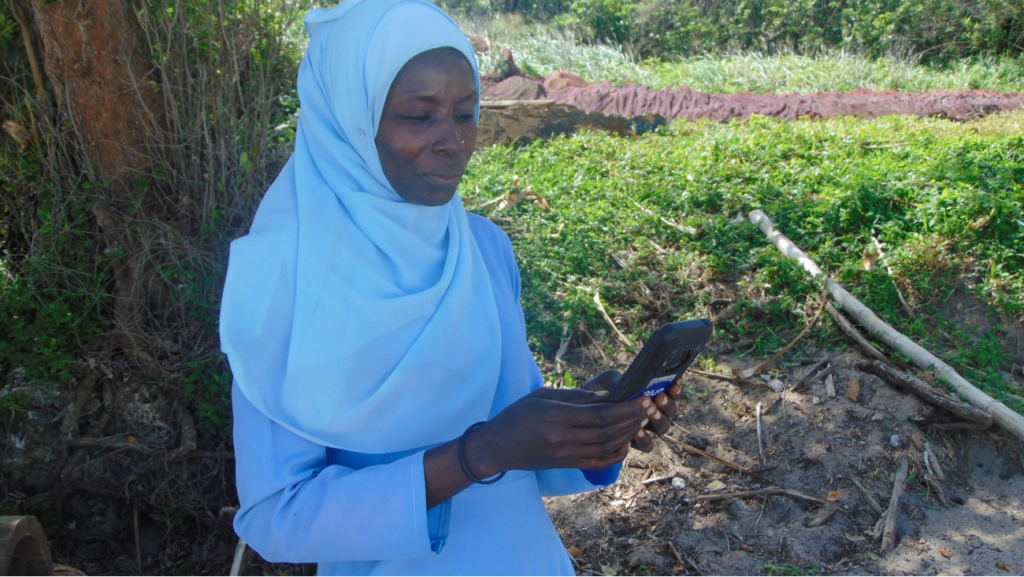
Ranger Asha Juma using the EarthRanger digital tool to track the daily patrols.
Reflecting on how her involvement with Blue Alliance PECCA has changed her perspective on marine conservation, Asha Bakar says, “I have come to understand that conservation brings a lot of benefits, not just for the environment but for our community as well. Through the education I’m receiving, I’m able to teach others about the importance of protecting our marine resources.”
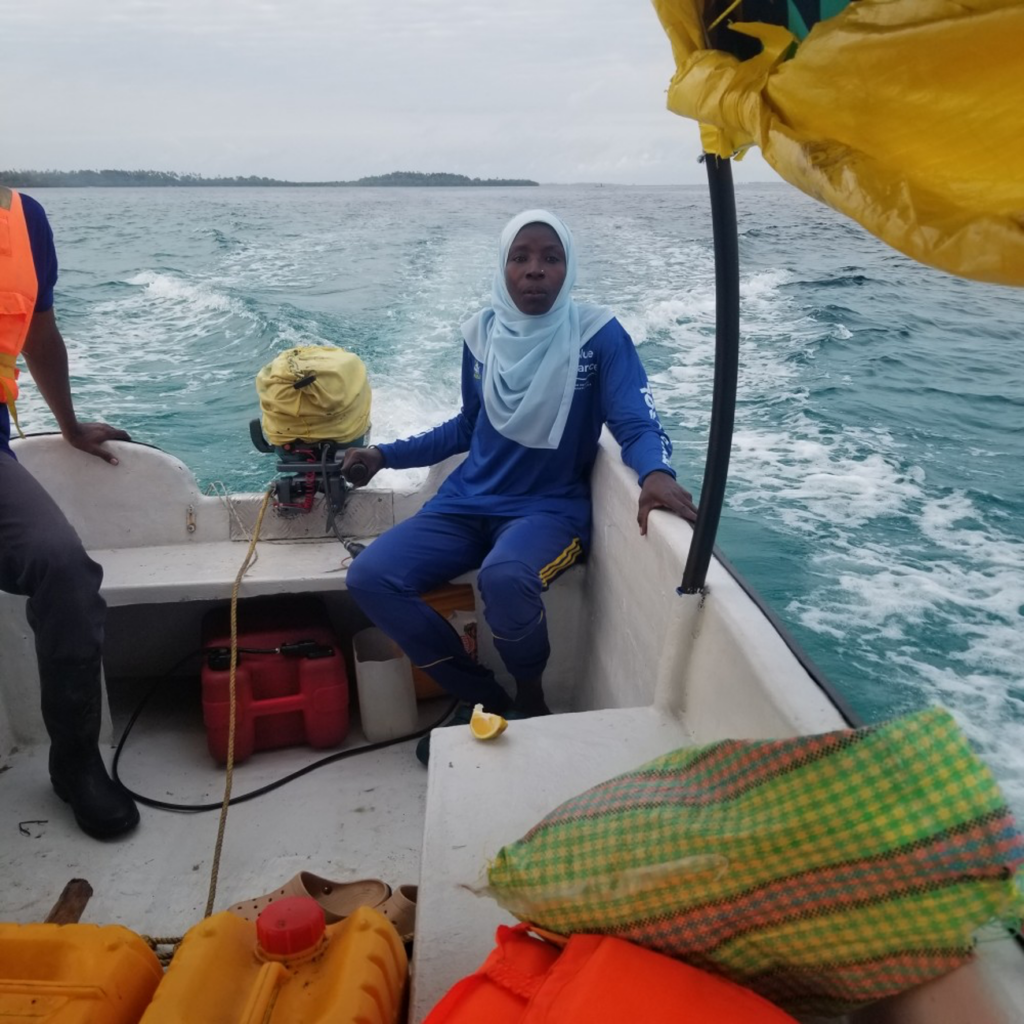
Ranger Asha Juma steering a boat during one of the regular sea patrols of Blue Alliance PECCA.
For both Asha Juma and Asha Bakar, conservation is deeply personal. Asha Juma, who lives with her family in Makangale, balances her role as a ranger with farming, growing cassava and sweet potatoes. “Before I became a ranger, I was a fisherwoman. But when I saw how overfishing was affecting us, I knew something had to change. That’s why I joined Blue Alliance,” she explains. “I wasn’t aware of conservation issues before, but now I understand that it can help our community improve its income.” Similarly, Asha Bakar juggles multiple responsibilities, including being a mother of six, a farmer, and a fisherwoman. She describes her daily routine: “A typical day in my life starts in the morning at the farm, growing cassava and sweet potatoes. After finishing my home activities, I head to the Blue Alliance office in the afternoon to check the area for plastics and other waste, clean, and participate in patrols if scheduled.”
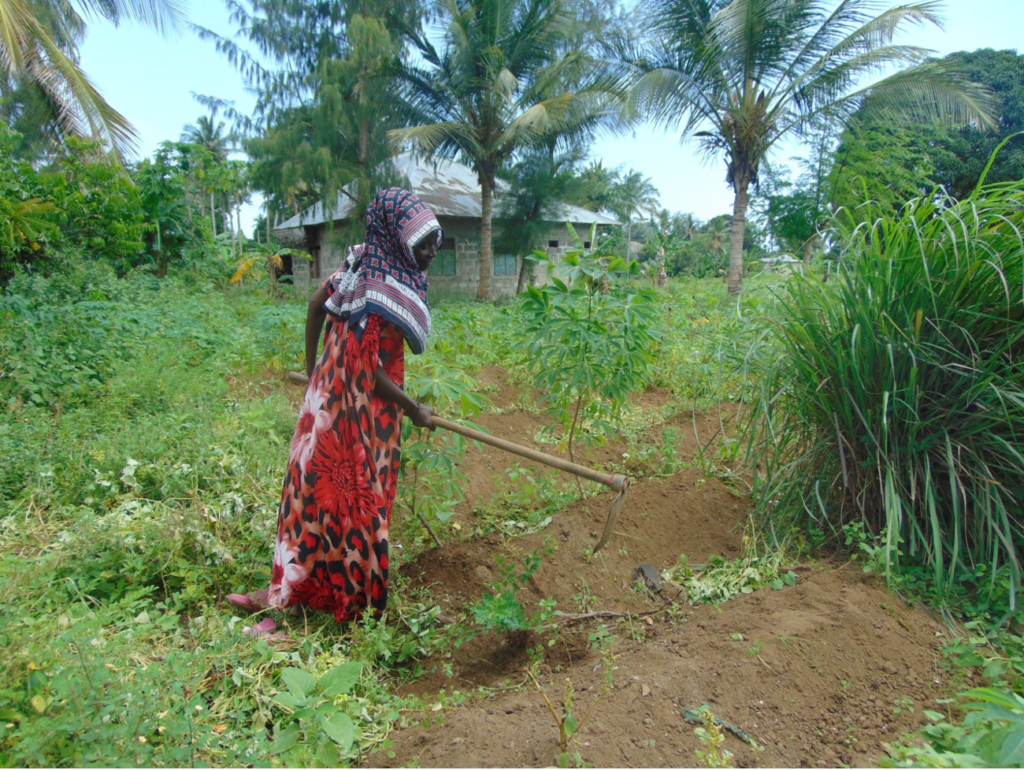
In addition to being a ranger, Asha Juma also works as a farmer, growing cassava and sweet potatoes.
The female rangers regularly participate in swimming trainings initiated by Blue Alliance. By exploring the underwater world and gaining a deeper understanding of marine ecosystems, they are better equipped to make informed decisions and take appropriate actions.
Although many celebrate their achievements, the work of the two female rangers also comes with challenges. In a community where women don’t typically take on such roles, Asha Juma and Asha Bakar are regularly facing skepticism and even hostility. Some view them as outsiders, disrupting the status quo. “The biggest challenge for me is that some people view my work negatively. They think I might adopt bad manners because I work with men, and sometimes they see me as an enemy because I stop them from illegal fishing”, says Asha Juma. Asha Bakar agrees that they are often seen as the enemies and adds: “We receive many bad words from some people, sometimes they even throw stones at us.”
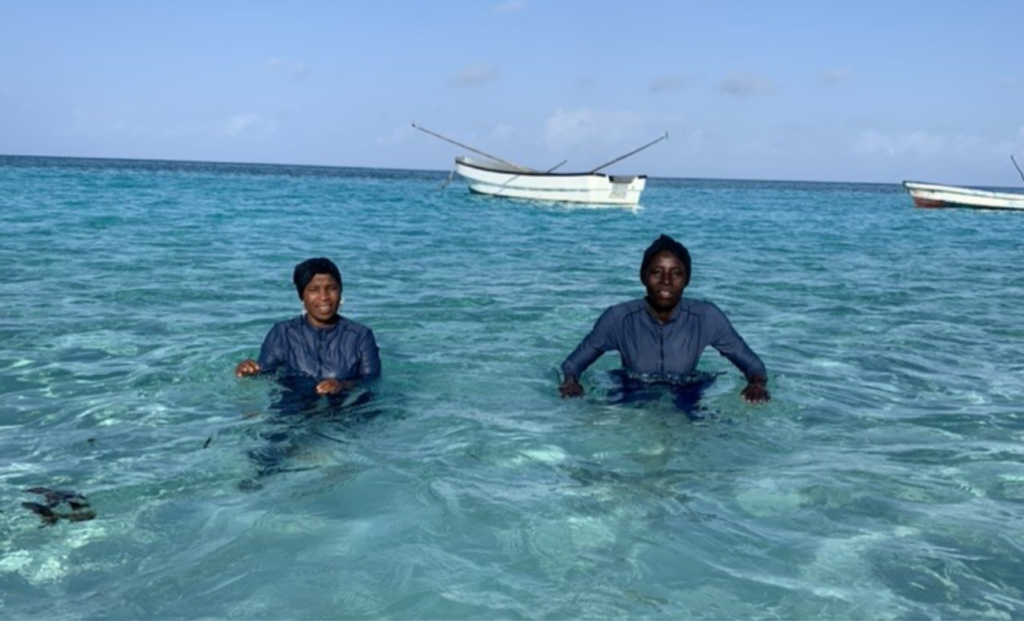
One of their most harrowing experiences occurred when the two rangers were kidnapped by local fishermen angered by their enforcement activities. Fortunately, they were rescued by the local police force, ‘Kikosi Maalum cha Kuzuia Magendo’ (KMKM), with whom Blue Alliance PECCA collaborates for compliance and enforcement activities.
To address tensions and incidents such as these, Blue Alliance PECCA and its local enforcement partners have implemented a conflict resolution mechanism. This approach involves follow-up meetings with the offending parties, engaging in dialogue, and reaching an agreement to prevent future conflicts with the rangers.
Despite the risks and challenges the rangers face every day, they keep on with their work, driven by a deep commitment to protect their environment. Asha Bakar explains, “I have been inspired to be a ranger because I understand that when we use the marine resources properly, we will have so much benefit from it.” And their work is already making a difference: Fish populations are rebounding, and the community is beginning to reap the benefits. “The most rewarding part of being a ranger is seeing more fish and octopus being caught by the fishermen, which helps support their families and improve their economic activities”, says Asha Juma. Asha Bakar echoes this sentiment, noting, “The good results of our conservation activities make me even more motivated in my work.” Both women hope that their efforts will continue to contribute to a healthier ocean with more fish, leading to enhanced livelihoods for their neighbours and eventually improved economic opportunities such as through sustainable ocean-based tourism.
Gender inequality in Pemba, Zanzibar
Although Pemba Island, through the United Republic of Tanzania, has ratified multiple global and regional frameworks that have the potential to enhance the lives of women and girls, the enforcement of these policies has been challenging. Despite commitments to gender equality, traditional norms and socio-political obstacles have impeded the full realisation of these initiatives, leaving significant gender disparities in place. Women in Pemba, for instance, face
in leadership positions and the formal labour market, especially in high-paying jobs and certain industries. These barriers make it challenging for women to break into fields traditionally dominated by men, such as marine ranger roles and wider work in marine conservation.
Through the many challenges, the two women remain hopeful for the future. Asha Juma and Asha Bakar believe their efforts will lead to healthier marine ecosystems, which in turn will improve their communities’ livelihoods. “I hope to see an increase in fish populations and coral health, which will lead to a better income for our fishermen and community”, shares Asha Bakar.
As they continue to patrol the waters of Pemba, Asha Juma and Asha Bakar are not just safeguarding marine life—they are also breaking barriers and inspiring other women. By protecting the ocean and challenging societal norms, these female rangers are helping to build a future where both nature and people can thrive.
Learn more about the work of Blue Alliance in North Pemba, Zanzibar at bluealliance.earth/pemba-channel-conservation-area/
Photos courtesy of Blue Alliance Marine Protected Areas
This solution story was initially published by the Global Fund for Coral Reefs here.
Joining the Race in March 2023, the Global Fund for Coral Reefs (GFCRs) a public-private partnership driven by more than 60 member states, UN agencies, financial institutions, philanthropies, impact investors, and conservation organizations, including developing coral nations, has implementation and investments underway in more than 20 countries to protect coral reefs with the greatest chances of surviving climate change (coral refugia). Early achievements include: catalytic support to over 60 reef-positive businesses and financing facilities; 1.69 million hectares of coral reef area under improved management; 2.5 million hectares of marine protected areas (MPAs) with sustainable financing mechanisms in place; large-scale private investments unlocked in several industries including sustainable agriculture, seaweed, ecotourism and pollution management; the first-ever debt-for-nature swap dedicated to coral reefs secured; and over $60 million USD in additional public and private financing leveraged for coral reef impact. In addition, GFCR Equity Fund managed by Pegasus Capital Advisors has newly announced an investment of up to a $50 million in Brazil-based innovator Agrion Agrisolutions to address key agricultural threats facing the local coastal reefs ecosystems.






